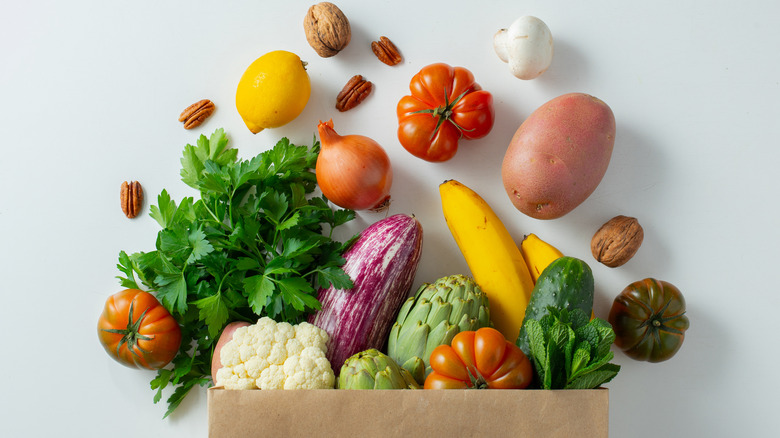How To Choose A Diet That's Best For You
Many people are interested in dieting and weight loss, and statistically speaking, the numbers reflect the intrigue. Research published in the Obesity Reviews journal indicated that 42% of adults from general populations are trying to lose weight.
There were also 10 primary reasons why people want to drop a few pounds. Being motivated by family members, wanting to enhance professional life, and a desire to improve health or prevent disease were among the top 3 reasons. General recommendations from a health professional and improving self-esteem were on the list as well.
But what about the percentage of people who want to maintain or gain weight? It can be hard to find which diet is best when you're not trying to lose weight, as much of the advice out there is geared toward people who are trying to do so. Whatever your health goals may be, here are 3 tips for discovering which diet is right for you.
Defining a diet
Before we dive in, it's important to understand the true definition of a diet. Biology Online defines a diet in 2 ways — the first definition (we'll call this diet A) involves day-to-day lifestyle and pertains to what you regularly eat and drink. The second definition (diet B) is how society has coined the word "diet" in terms of restriction and control to achieve a particular goal.
Ironically, the reason why so many people seem to fail at achieving their goals is that they focus too much on diet B and not enough on diet A. As Active put it, restrictive diets don't last, they make you hungry, they make you tired, and they lower your metabolic rate.
By shifting your attention away from the quickest way to hit your goals and more toward developing a habit of eating healthier, balanced meals, you'll position yourself for long-term success.
Taking stock of your bio-individuality
Bio-individuality, a term made popular by groups such as the Institute for Integrative Nutrition, refers to the idea that every person has a unique set of needs. There are many nutritional theories, such as the keto diet, veganism, and paleo. Choosing the right one for you can't be done without evaluating factors such as genetics, food sensitivities, and other considerations that can greatly vary from one person to the next.
Backed by science, per The Guardian, a project conducted by researchers in Israel produced data that disputes the age-old model of recommending the same general food guidelines to everyone. Instead, a custom-made diet that takes individual biological makeup into consideration is key.
Eran Segal, a biologist who participated in the study, said the discovery is applicable to everyone regardless of their goals. "We see tremendous variability in people's responses to foods," he told The Guardian. "So if you want to prescribe diets, they have to be personally tailored."
Some things you can do to assess your own bio-individuality include taking a food sensitivities test, getting a physical exam, having your doctor draw blood work, paying attention to which foods you crave, your culture and traditions surrounding meals, and how your body responds to certain foods.
Choosing a lifestyle instead of a temporary diet
Ask yourself, "Could I really eat like this until the day I die without compromising any aspect of my health?" The first part of this question reminds you to focus on a diet in the sense of your daily habits. According to Psychology Today, more than 85% of people who opt for quick fixes regain all of their weight within 1 year. Not only is this bad for your body, but it's also bad for your mental health. For example, if you're thinking about veganism as a temporary fix, then it may not be the right plan for you.
The second part of the question forces you to keep your overall well-being in mind as opposed to appearances alone. There's nothing wrong with wanting to look a certain way, as long you have a positive body image. It's an issue when what you're doing to achieve that look puts other aspects of your health at risk.
Let's go back to the vegan example, for instance. WebMD reported that 92% of vegans studied by German researchers were B12 deficient — that's nearly all of them! B12 is essential for the health of your red blood cells, bones, eyes, brain, heart, hair, skin, nails, mood, and energy (per Healthline). If you're leaning toward veganism, you may also need to include a B12 supplement as part of your regimen.
Considering your exercise preferences
Exercise is good for a lot of things and shouldn't be avoided. The Mayo Clinic stated that the benefits of exercise include weight control, preventing or managing health conditions and diseases, improving your mood, boosting your energy, promoting better sleep, and enhancing your libido. With that said, the types of exercises you do may be influenced by the type of diet you choose.
When you think of food as fuel, you'll understand that different amounts of macronutrients (protein, carbs, and fats) will energize you for different types of workouts, per Western Wisconsin Health. Personal trainer and author Heidi Powell told Daily Burn that if at least half of your calories come from carbs, you should do exercises focused on building muscle like weight lifting. If half of your calories come from fat, focus on exercises that burn fat like cardio or HIIT.
Some diets are naturally carb-heavy (like veganism) and others are naturally fat-heavy (like keto). Now, that doesn't mean vegans can only lift weights and never do cardio or that people who practice keto only have to do HIIT as opposed to weight lifting. What it does mean is that you should be mindful of your macros and choose a plan that you can truly commit to over time.
Diets that actually work
If taking all of this into consideration is a bit overwhelming, Healthline notes there are 5 diets actually supported by data. Each diet is special in its own right and can serve as a good place to start as you begin to consider which one is right for you.
The low-carb, whole food diet may be a great option if you're trying to lose weight, minimize your chances of becoming ill, or looking to improve your overall health. This diet also allows you to adjust how many carbs you consume based on the goals you want to achieve. Whole foods, such as fruits, vegetables, nuts, meat, dairy, and fats, are staples of this diet.
The Mediterranean diet is efficient for preventing heart disease and includes fruits, vegetables, meat, dairy, whole grains, and extra virgin olive oil.
The paleo diet is also known as the caveman diet, according to Everyday Health. It focuses on omitting high-fat foods and eating predominantly fruits, non-starchy vegetables, and lean meats.
The vegan diet involves eating only plant-based foods and mainly consists of fruits, vegetables, and whole grains. As of January 2021, about 79 million people around the world were thought to be vegan (per The VOU). In the U.S., 78% of vegans are women, and 12% of millennials are vegan or vegetarian (via Deals on Health).
If you find foods like wheat, rye, and barley don't agree with you, the gluten-free diet may be the most ideal choice.






